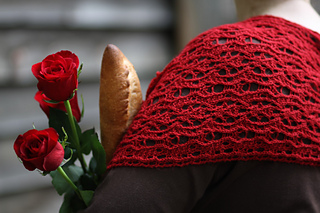patterns >  Gannet Designs and 1 more...
Gannet Designs and 1 more...
> Bread and Roses



Bread and Roses
The phrase bread and roses originated in the early twentieth century in the American labor movement. There are stories about it being sung as part of a song by strikers, which seems to be apocryphal. The meaning is not, however: Bread and Roses stands for the desire for both fair wages and dignity. The slogan has particularly come to be associated with a textile workers’ strike in Lawrence, Massachusetts in 1912.
I looked up the individual concepts for bread, roses, and labor unions in the Dewey Decimal System (used to catalog books in many libraries in the US) and then placed the numbers on a grid as a starting point for designing this lace. The yarn overs in the alternating columns of lace in the middle are placed based on bread and roses; the border is generated with the numbers for labor unions. Decreases were placed to form undulating lines; occasional two-stitch cables highlight this effect.
(For more on this method of designing stitch patterns, see my blog posts on embedding meaning in knitting or other crafts.)
This pattern can be used to knit a rectangular scarf or stole.
Size:
- 6.5 (12.5) inches wide x 67.5 inches long [16.5cm (32cm) x 171cm]; width and length are both adjustable.
Gauge:
- 19 stitches and 32 rows over 4 inches [10cm] in lace pattern, after blocking.
Materials needed:
- 650 yards [595m] of fingering weight yarn. Sample is worked in Berocco Ultra Alpaca Fine.
- US size 6 needles [4mm] or size needed to make a fabric you like with your yarn.
- A yarn needle for weaving in ends.
- 1.5 yards [1.4m] of waste yarn for provisional cast-on. cable needle (optional).
Techniques:
- You need to know how to do a provisional cast-on, knit lace with double yarn overs, knit cables, work a knitted-on edging, graft garter stitch, and block lace.
- There is patterning worked with knits and purls on the wrong side rows, so there are no rest rows.
Thanks to my technical editor, Stephanie Boardman , my photographer, Kathryn Wall , and my sample knitter, Wendy Long. Also thanks to my test knitters!
14322 projects
stashed
12582 times
- First published: September 2014
- Page created: September 1, 2014
- Last updated: February 9, 2024 …
- visits in the last 24 hours
- visitors right now





